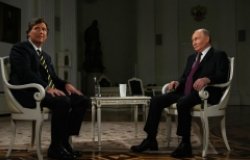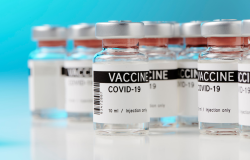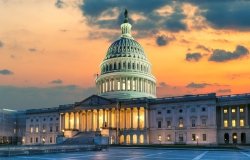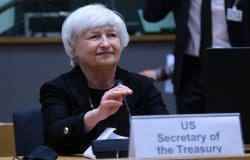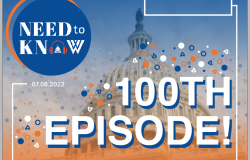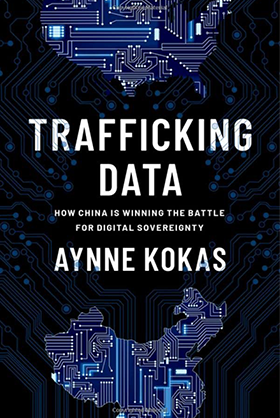No Matter What Putin Says — Russian People Have No Appetite for War
Some pundits are calling this a “new Cold War,” but neither the Russian nor American public actually wants a sustained conflict, writes Matthew Rojansky and Kenneth Yalowitz.
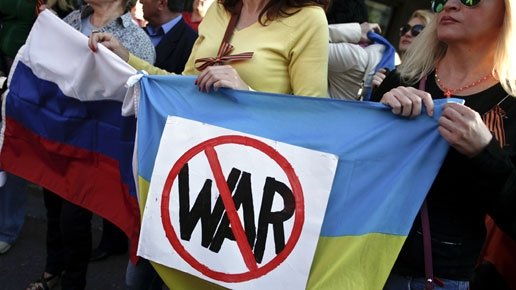
Russia and the West are again at odds, eying each other with suspicion over Moscow’s annexation of Crimea and support of armed separatists in Eastern Ukraine. Basic rules of the game for security, stability and prosperity in Europe and beyond are at stake. Some commentators are calling this a “new Cold War.”
But the crucial fact is that the public on each side does not have any appetite for a sustained conflict.
Attention has focused on the key leaders — President Barack Obama, Russian President Vladimir Putin, Ukrainian President Petro Poroshenko and German Chancellor Angela Merkel. Putin has used his acts of aggression to build public support. Yet the focus should be on whether the Russian people want renewed confrontation — or would even countenance something like a “new Cold War.”
Russia may not be a democracy, but it is also not the totalitarian Soviet Union. The flip side of Putin’s brand of authoritarian populism is his reliance on public opinion to maintain legitimacy.
Putin’s popularity ratings have soared from roughly 50 percent to more than 80 percent since the annexation of Crimea, and his domestic opposition has been effectively muted. The less educated, more conservative and nationalistic segments of the Russian public have enthusiastically bought into his attacks on the West for ignoring or threatening Russia’s strategic interests.
truman & stalinMore than half of all Russians, according to the polling agency VCIOM, now agree that relations with the West “can only be tense and be based on distrust.” Nor is this a new phenomenon — eastward expansion of the North Atlantic Treaty Organization, Western support for Kosovo independence and the “color revolutions” throughout the post-Soviet periphery all heightened Russians’ sense that the West was taking advantage of their weakness.
Popular support for translating this anti-Western resentment into a sustained confrontation, however, appears shallow at best. Though another Russian polling agency, the Levada Center, reports negative attitudes toward the United States at a 20-year high, both Levada and VCIOM confirm that nearly two-thirds of Russians view isolation from the West as unlikely or impossible.
In addition, despite strong opposition to the new Western-backed government in Ukraine, most Russians oppose further military intervention there, even while they support diplomatic and economic assistance for Russian speakers in the region. Russian troops are still present near Ukraine’s eastern border, but Putin has clearly backed off from a full-scale invasion — likely calculating that the Russian public would not tolerate the high costs of a prolonged and bloody conflict in Ukraine.
If the current ceasefire fails and leads to greater bloodshed, Russian public opinion could still shift in favor of intervention. For now, however, Russians expect more from their leaders to sustain health, pension and education investments, deliver concrete progress on the economic modernization agenda and stem the brain drain and capital flight that are weighing down economic growth.
A huge video screen on Sword Beach shows U.S. President Barack Obama and Russian President Vladimir Putin as they arrive for the International 70th D-Day Commemoration Ceremony in OuistrehamAdditional punitive sanctions from the West, especially on Russia’s revenue-generating energy and natural resource exports, would make these tasks far harder. So Putin has strong incentives to quit escalating confrontation and focus on consolidating his early gains.
Fortunately for the Kremlin, there is also little appetite on the Western side for deepening the conflict. Europeans are largely interested in preventing the unraveling of their main accomplishment since World War II — the economic growth, stability, and democratization brought about through European Union integration.
Though the annexation of Crimea has restored enthusiasm for a robust NATO alliance, in the last EU parliamentary elections voters rejected calls for increased military spending. European businesses are also not ready to sever extensive economic ties with Russia.
For their part, Americans are confronting a bevy of difficult foreign-policy issues — chaos in Iraq, China’s rise and nuclear negotiations with Iran. Putin and Russia provide fodder for campaign trail bombast or cable news talk shows, but neo-containment is not a high priority for either the U.S. public or their elected leaders.
If there is a silver lining in the current Ukraine crisis, it is that the public on all sides are not enthusiastic for a “new Cold War.” This does not provide a blueprint for starting to restore relations but it means there may be a ceiling to the mutual hostility and distrust.
Russian President Vladimir Putin talks with German Chancellor Angela Merkel as they attend the International 70th D-Day Commemoration Ceremony in OuistrehamFor now, the West would be well advised to keep doors of communication open to Russians . The most effective means is to keep cooperative efforts and exchanges alive in science, culture and education. Public diplomacy outreach needs to be increased but conducted with sensitivity to Russians’ distinct narrative.
Finally, broader bilateral dialogue must continue in all dimensions, including security, trade relations and human rights. A Bilateral Presidential Commission was formed by the two governments in 2009 but is now dormant — and it should involve not only government officials but also think tanks, universities, civic groups and businesses. All these steps would sustain the hopes of the many Russians who still value ties with the West and oppose a path toward deeper conflict and isolation.
About the Author

Matthew Rojansky
President and CEO, U.S. Russia Foundation
Matthew Rojansky, the President and CEO of the U.S. Russia Foundation and a Distinguished Fellow at the Wilson Center’s Kennan Institute, is as much a regular at Congressional briefings and on prime-time news shows as he is on the streets of Moscow, Kyiv, or Berlin. One of the country’s leading analysts of US relations with Russia, Ukraine, and the region, he has advised governments and international organizations and leads track two diplomacy on Eurasian conflicts.
Read More
Kennan Institute
The Kennan Institute is the premier US center for advanced research on Russia and Eurasia and the oldest and largest regional program at the Woodrow Wilson International Center for Scholars. The Kennan Institute is committed to improving American understanding of Russia, Ukraine, Central Asia, the Caucasus, and the surrounding region though research and exchange. Read more
